Esports Betting: Strategic Analysis and Market Intelligence
Esports has emerged as a dominant force in competitive entertainment, attracting millions of viewers and creating substantial wagering opportunities across multiple game titles and tournament formats. The digital nature of competitive gaming provides unique analytical advantages through transparent statistical data, while the rapid evolution of team compositions and strategic approaches creates dynamic betting environments for dedicated analysts.
Understanding Esports Betting Fundamentals
Successful esports wagering requires comprehensive analysis that extends beyond simple team rankings or recent match results. The digital gaming environment produces extensive data streams that enable sophisticated analytical approaches unavailable in traditional sports.
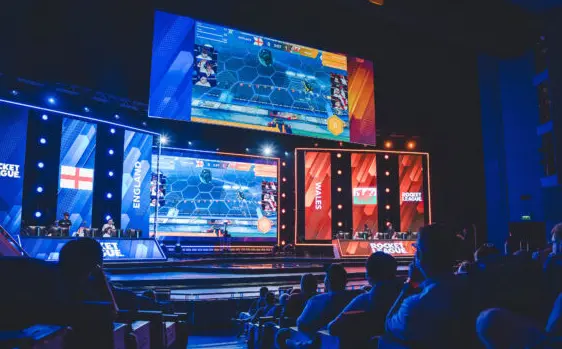
ESports Betting
Team composition analysis forms the foundation of esports betting as roster changes occur frequently and dramatically impact competitive performance. Unlike traditional sports where player transfers happen seasonally, esports teams may alter lineups between tournaments or even mid-season, creating opportunities for bettors who track personnel movements.
Meta evolution represents a unique aspect of esports betting where game developers regularly update competitive titles through patches that alter character abilities, weapon statistics, or map designs. Understanding how these changes affect different teams and playstyles provides significant analytical advantages.
Practice regimen evaluation helps assess team preparation quality and potential performance levels. Teams that maintain intensive practice schedules and demonstrate tactical innovation often outperform opponents with superior individual talent but inferior preparation methods.
Individual player form fluctuates more dramatically in esports than traditional sports due to factors including mechanical skill requirements, reaction time variations, and mental fatigue from extended gaming sessions. Tracking player consistency across different tournament periods reveals patterns that influence match outcomes.
Regional competitive strength varies significantly across different esports titles, with certain geographic areas dominating specific games due to infrastructure development, cultural acceptance, and talent development programs. Understanding these regional advantages helps evaluate team quality relative to their competitive environment.
Tournament format analysis proves crucial as different event structures create varying competitive pressures and strategic approaches. Single-elimination formats produce different dynamics than double-elimination or round-robin tournaments.
Major Esports Categories and Betting Markets
| Apex Global Championship (Apex Legends) | Valorant Vanguard Open (Valorant) | CS2 Elite Series (Counter-Strike 2) | Overwatch World Clash (Overwatch 2) |
| Rocket League Summit (Rocket League) | Dota 2 Horizon Cup (Dota 2) | League Legends Invitational (League of Legends) | StarCraft Nova Masters (StarCraft II) |
| Call of Duty Prime League (Call of Duty) | Rainbow Six Siege Pro Circuit (Rainbow Six Siege) | Fortnite Global Showdown (Fortnite) | Hearthstone Grand Prix (Hearthstone) |
| PUBG Continental Classic (PUBG) | Smite World Finals (Smite) | Halo Infinite Challenge (Halo Infinite) | Tekken Global Arena (Tekken 8) |
| Street Fighter Alpha Cup (Street Fighter 6) | Mortal Kombat Pro Series (Mortal Kombat 1) | Apex Legends Circuit (Apex Legends) | Valorant Ascension Tournament (Valorant) |
Multiplayer Online Battle Arena (MOBA)
MOBA games including League of Legends and Dota 2 feature complex strategic elements that create numerous betting opportunities through their deep tactical systems and objective-based gameplay.
Draft phase analysis provides early insights into team strategies and potential match outcomes as champion selections reveal tactical approaches and individual player comfort levels. Understanding meta picks, comfort selections, and strategic counters helps predict team performance before games begin.
Objective control patterns distinguish superior teams from weaker opponents as securing major map objectives like Baron, Dragon, or Roshan requires coordination and strategic timing that reflects overall team quality.
Late game scaling analysis helps predict match outcomes as different team compositions perform better in early, mid, or late game phases. Teams with strong early game potential might need to secure decisive advantages before opponents reach power spikes.
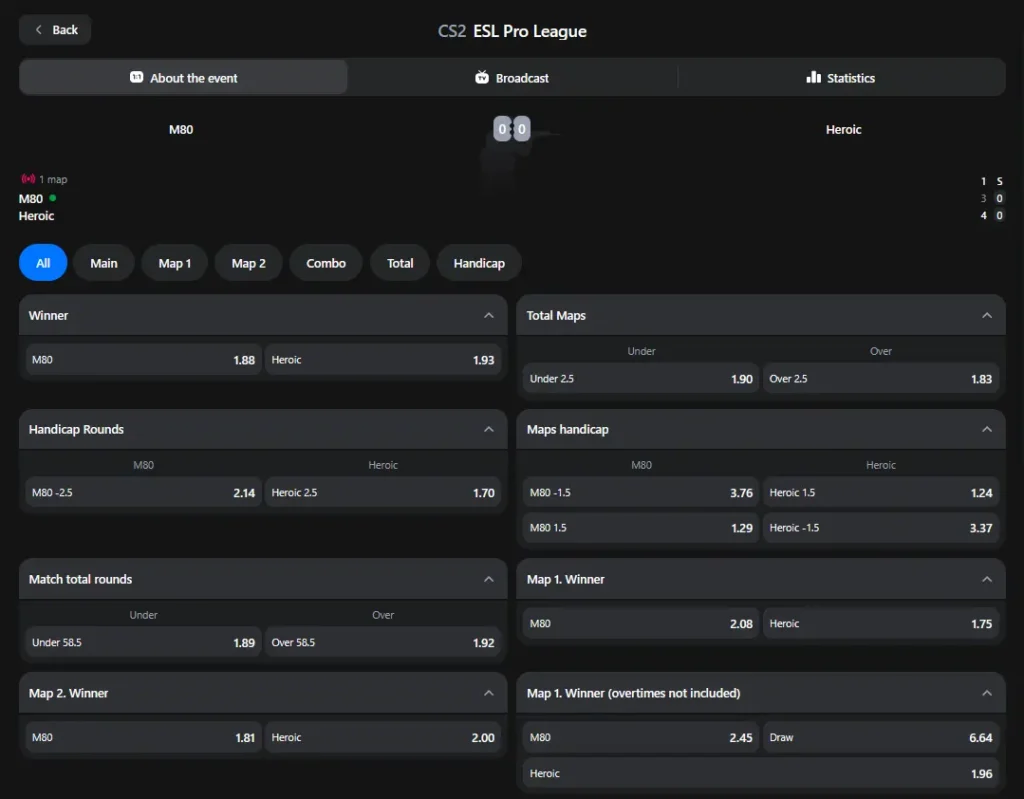
1Win ESports Betting
First-Person Shooter (FPS)
FPS titles including Counter-Strike, Valorant, and Call of Duty create betting opportunities through individual aim skill, team coordination, and tactical execution analysis.
Map specialization becomes crucial as teams often demonstrate superior performance on specific maps due to strategic preferences, tactical preparation, or individual player comfort levels. Understanding map pools and team strengths creates betting value.
Economic management in tactical shooters affects round outcomes as teams must balance weapon purchases, utility usage, and saving decisions that influence competitive positioning throughout matches.
Anti-stratting capabilities determine how well teams adapt to opponent tactics and implement counter-strategies. Teams with superior analytical preparation often outperform more mechanically skilled opponents.
Real-Time Strategy (RTS)
RTS games including StarCraft II feature individual competition that emphasizes micro-management skills, build order optimization, and real-time tactical adaptation.
Build order analysis reveals player preparation quality and strategic flexibility as different approaches suit various matchups and map configurations. Understanding meta builds and player preferences helps predict early game development.
Macro economic management separates elite players from lower-tier competitors as resource optimization and multitasking ability determine long-term competitive advantages.
Battle Royale
Battle Royale titles including PUBG and Apex Legends combine individual skill with team coordination in large-scale competitive environments that create unique betting dynamics.
Zone positioning strategy affects survival probability and placement outcomes as teams must balance aggressive play for eliminations against conservative positioning for consistent placements.
Equipment management influences team performance as weapon selections, armor distribution, and utility usage affect combat effectiveness throughout match progression.
Tournament Structure Analysis
Major International Championships
Tier-one international tournaments attract top teams worldwide and feature extensive preparation periods that create predictable performance patterns for analytical bettors.
Regional qualification processes affect team motivation and preparation quality as different regions employ varying qualification methods that influence competitor commitment levels.
Tournament scheduling impacts team performance as jet lag, cultural adjustment, and extended travel periods affect international competitors differently than domestic opponents.
Regional League Systems
Domestic leagues create different competitive dynamics than international tournaments as teams develop familiarity with opponents and establish consistent performance patterns over extended periods.
Regular season positioning affects playoff preparation as teams securing early qualification might experiment with strategies or rest key players during final regular season matches.
Online vs Offline Competition
Competition environment significantly impacts team performance as online tournaments eliminate travel requirements but introduce technical variables including internet connectivity and equipment differences.
LAN adaptation varies between teams as some competitors excel in offline environments with crowd pressure while others perform better in controlled online settings.
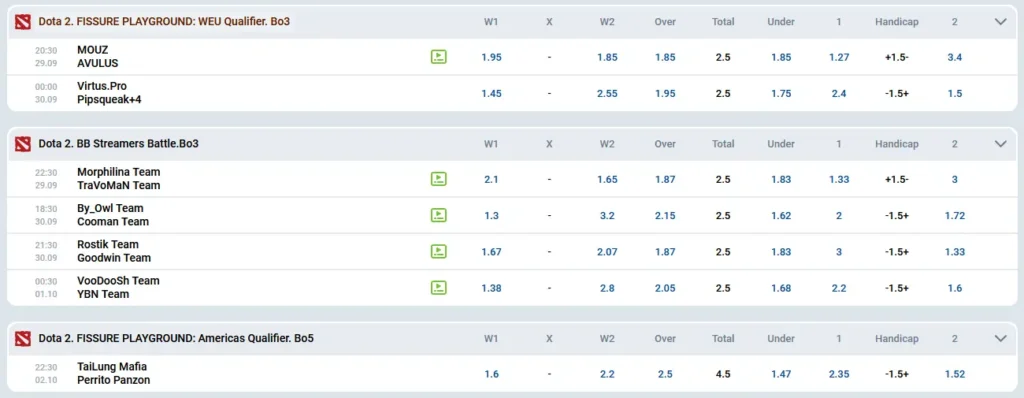
Mostbet Dota 2 Betting
Popular Esports Betting Markets
Match
Mostbet
1xBet
1Win
Team 1
Team 2
Team 1
Team 2
Team 1
Team 2
FUT Esports vs Sangal Esports
1.60
2.20
1.63
2.241
1.63
2.24
GUNS Esports vs Monte
2.03
1.70
2.05
1.74
2.05
1.74
Ruby vs HOTU
2.45
1.48
2.603
1.46
2.60
1.46
AKA HERO KAJO (W) vs Hindsight (W)
1.45
2.55
1.39
2.808
1.35
2.80
Peekaboo (W) vs Shinigami (W)
2.00
1.73
1.87
1.87
1.82
1.82
Match Winner Analysis
Esports match winner betting requires sophisticated analysis that accounts for team form, head-to-head records, and game-specific factors that influence competitive outcomes.
Current form assessment extends beyond recent match results to include practice performance, strategic innovation, and individual player development that might not reflect in public match records.
Head-to-head analysis reveals psychological advantages and tactical knowledge as teams familiar with opponents often employ specific strategies designed to exploit known weaknesses.
Map/Game Handicaps
Handicap betting in esports accounts for skill disparities by applying virtual advantages that equalize competitive imbalances between teams of different quality levels.
Map pool analysis affects handicap calculations as team strengths vary significantly across different competitive environments within the same game title.
Total Maps/Rounds
Totals betting requires understanding team tactical approaches and their tendency to produce quick decisive victories or extended competitive battles.
Tactical timeout usage affects match duration as teams with superior mid-game adaptation often extend contests through strategic adjustments that prolong competitive battles.
First Objective Markets
Esports provides unique betting opportunities through game-specific objectives including first blood, first tower, first dragon, or economic advantages that occur within matches.
Early game aggression patterns help predict first objective outcomes as teams with aggressive early strategies naturally create more opportunities for initial advantages.
Player Performance Props
Individual player statistics in esports provide detailed betting opportunities through kills, deaths, assists, damage dealt, and role-specific metrics that vary between game titles.
Role specialization affects statistical expectations as support players accumulate different statistics than carry players or fraggers who focus on elimination-based contributions.
Live Betting Dynamics
Esports live betting offers exceptional opportunities due to the rapid pace of digital competition and real-time statistical feedback that creates numerous momentum shifts throughout matches.
Comeback potential varies significantly between game titles as some competitions feature stronger snowball effects while others allow dramatic reversals through strategic play.
Equipment malfunctions or technical issues create temporary betting value as hardware problems affect individual player performance until resolution.
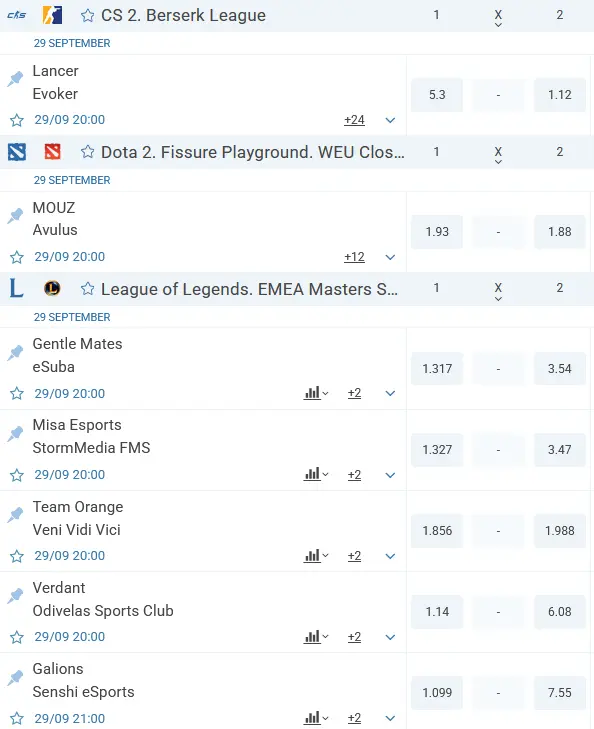
ESports 1xBet
Tournament-Specific Strategies
League of Legends World Championship
The annual World Championship represents League of Legends’ premier event with unique competitive dynamics created by international team interactions and extended tournament duration.
Regional strength analysis helps identify undervalued teams as different competitive regions demonstrate varying success rates at international events.
The International (Dota 2)
Dota 2’s premier tournament features the largest prize pool in esports and creates unique competitive pressures that affect team performance compared to regular season competition.
Direct invitation criteria and qualification processes influence team motivation and preparation quality leading up to the main event.
Counter-Strike Major Championships
CS:GO Majors feature distinctive formats and qualification systems that create specific analytical opportunities for bettors who understand the competitive structure.
Map pool dynamics change periodically as tournament organizers rotate competitive maps that favor different tactical approaches and team strengths.
Valorant Champions
Riot Games’ tactical shooter championship combines elements from traditional FPS competitions with unique agent-based abilities that create complex strategic interactions.
Agent meta evolution affects team performance as character balance changes influence strategic approaches and individual player effectiveness.
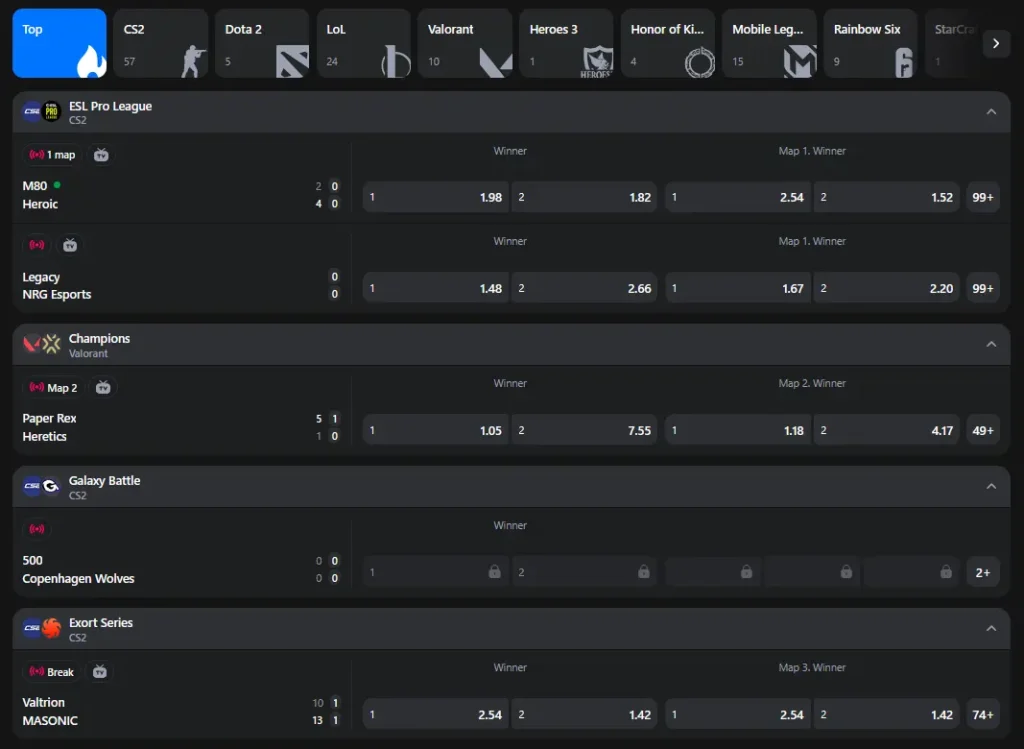
ESports 1Win
Game-Specific Analysis Techniques
MOBAs Statistical Approach
Multiplayer Online Battle Arena games generate extensive statistical data that enables sophisticated analytical approaches for dedicated bettors.
Gold per minute differentials indicate team efficiency and map control effectiveness as economic advantages typically translate into competitive benefits.
Kill participation rates reveal individual player impact and team coordination levels as players with higher involvement percentages contribute more significantly to team success.
Objective control percentages demonstrate strategic execution as teams securing major objectives consistently typically possess superior coordination and tactical preparation.
FPS Precision Metrics
First-person shooter analysis focuses on aim accuracy, positioning effectiveness, and tactical execution that determine competitive outcomes.
Headshot percentages indicate individual mechanical skill levels as consistent precision translates into reliable performance across different matches.
Clutch situation success rates reveal mental resilience and individual ability to perform under pressure during crucial round moments.
Economic efficiency in tactical shooters measures how effectively teams convert financial resources into competitive advantages through weapon and utility purchases.
RTS Mechanical Analysis
Real-time strategy games emphasize individual multitasking ability and strategic decision-making that create predictable performance patterns.
Actions per minute measurements indicate mechanical skill and micro-management ability that directly correlate with competitive effectiveness.
Resource collection efficiency separates elite players from lower-tier competitors as economic optimization enables strategic flexibility and tactical options.
Battle Royale Positioning
Battle Royale competitions require spatial awareness and risk management that affect placement outcomes and elimination potential.
Zone rotation timing demonstrates strategic understanding as teams must balance aggressive positioning for eliminations against conservative play for consistent placements.
Equipment priority analysis reveals team tactical approaches as different loadout preferences indicate varying strategic philosophies and risk tolerances.



 Kieran Aldridge
Kieran Aldridge
